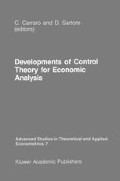Abstract
In a world of interdependent economies, rational policy makers in one country must condition their actions on the policies to be expected in other countries and expect others to do the same. Policy selection inevitably acquires the form of a dynamic game. The persistence of world recession since 1974, and the debt crisis which appeared in its wake, has certainly made policy makers more conscious of the links between their economies and that mutual dependence through trade and capital movements means that the available policy choices are also interdependent. In fact, as the current uneven recovery shows, decentralised control of the world economy may effectively limit our ability to steer individual economies.
This research was undertaken, in part, on behalf of the EEC Commission in Brussels, and their support is gratefully acknowledged. However the opinions expressed here are my own, and do not necesarily reflect the policy of the EEC Commission.
Access this chapter
Tax calculation will be finalised at checkout
Purchases are for personal use only
Preview
Unable to display preview. Download preview PDF.
References
Aubin, J. P. (1979): Mathematical Methods of Game and Economic Theory, North Holland, Amsterdam.
Barten, A. P., G. d’Alcantara, and C. J. Carrin (1976): “COMET: A medium-term macroeconomic model for the European Economic Community”, European Economic Review 7, 63–115.
Basevi, G., O. Blanchard, W. Buiter, R. Dornbusch, and R. Layard (1984): “Europe: the case for unsustainable growth”, Centre for European Policy Studies, Brussels.
Begg, D. (1983): “The Economics of Floating Exchange Rates: the lessons of the 70s and the research programme for the 80s”, Memorandum in International Monetary Arrangements: Vol. HI (p. 4–56), HMSO, London.
Brandsma, A. S. and A. J. Hughes Hallett (1984a): “Noncausalities and time inconsistency in dynamic noncooperative games: the problem revisited”, Economics Letters 14, 123–130.
Brandsma, A. S. and A. J. Hughes Hallett (1984b) “Economic Conflict and the Solution of Dynamic Games”, European Economic Review 26, 13–32.
Brandsma, A. S., A. J. Hughes Hallett, and N. van der Windt (1984): “Optimal Economic Policies and Uncertainty: the case against policy selection by nonlinear Programming”, Computers and Operations Research 11, 179–197.
Bresnahan, T. F. (1981): “Duopoly Models with Consistent Conjectures” American Economic Review 71, 934–945.
Canzoneri, M. and J. A. Gray (1983): Monetary Policy Games and the Consequences of Noncooperative Behaviour, International Economic Review 26, 547–64.
Da Cuhna, N. and E. Polak (1967): “Constrained Minimisation of Vector-Valued Criteria in Finite Dimensional Spaces”, Journal of Mathematical Analysis and Applications 19, 103–24.
Fair, R. C. (1978): “The Sensitivity of Fiscal Policy Effects to Assumptions about the Behaviour of the Federal Reserve”, Econometrica 46, 1165–1179.
Friedman, J. W. (1977): Oligopoly and the Theory of Games, North Holland, Amsterdam.
Holt, C. A.: “An Experimental Test of the Consistent Conjectures Hypothesis” American Economic Review 75, 314–325.
Hughes Hallett, A. J. (1984): “Noncooperative Strategies for Dynamic Policy Games and the Problem of Time Inconsistency”, Oxford Economic Papers, 36, 381–399.
Hughes Hallett A. J. (1986): “International Policy Design and the Sustainability of Policy Bargains” Journal of Economic Dynamics and Control, 10 (forthcoming).
Hughes Hallett, A. J. and A. S. Brandsma (1983): “How Effective Could Sanctions against the Soviet Union Be?”, Weltwirtschaftliches Archiv, 119, 498–522.
Hughes Hallett, A. J. and H. J. B. Rees (1983): “Quantitative Economic Policies and Interactive Planning”, Cambridge University Press, Cambridge and New York.
Miller, M. and M. Salmon (1985): “Dynamic Games and the Time Inconsistency of Optimal Policy in Open Economies”, Economic Journal (Supplement, 124–135).
Neese, J. W. and R. S. Pindyck (1984): “Behavioural Assumptions in Decentralised Stabilisation Policies”, in A. J. Hughes Hallett (ed.) Applied Decision Analysis and Economic Behaviour, Nijhoff, Boston and the Hague.
Oudiz, G. and J. Sachs (1984): “Policy Coordination in Industrialised Countries”, Brookings Economic Papers (1), 1–64.
Tesfatsion, L. (1984): “The Consistency of Benevolent Government Economies”, paper presented to the Society of Economic Dynamics & Control, Nice, June 1984.
Van der Ploeg (1982) “Government Policy, Real Wage Resistance and the Resolution of Conflict”. European Economic Review 19, 181–212.
Van der Ploeg, F. and A. J. de Zeeuw (1986): “Noncooperative Strategies for Dynamic Policy Games and the Problem of Time Inconsistency: a Comment” unpublished manuscript.
Van der Windt, N. and J. C. Siebrand (1984): “An Annual Model of the US economy—Rasmus 2a” and “An Annual Model of the EC—Rasmus 3a”, Discussion papers 8408/G and 8411/G, Institute for Economic Research, Erasmus University Rotterdam.
Author information
Authors and Affiliations
Editor information
Editors and Affiliations
Rights and permissions
Copyright information
© 1987 Martinus Nijhoff Publishers, Dordrecht
About this chapter
Cite this chapter
Hallett, A.J.H. (1987). Optimal Policy Design in Interdependent Economies. In: Carraro, C., Sartore, D. (eds) Developments of Control Theory for Economic Analysis. Advanced Studies in Theoretical and Applied Econometrics, vol 7. Springer, Dordrecht. https://doi.org/10.1007/978-94-009-3495-5_12
Download citation
DOI: https://doi.org/10.1007/978-94-009-3495-5_12
Publisher Name: Springer, Dordrecht
Print ISBN: 978-94-010-8063-7
Online ISBN: 978-94-009-3495-5
eBook Packages: Springer Book Archive

